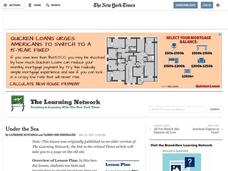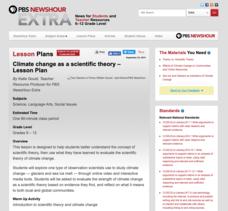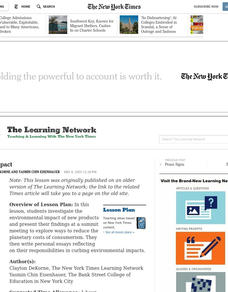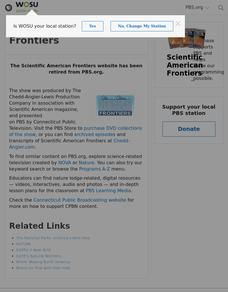Curated OER
Under the Sea
Young scholars imagine and describe fictitious sea animals that might live in the ocean. After reading an article, they reflect on new discoveries found in the ocean recently. Using the internet, they research the interdependence of...
PBS
Climate Change as a Scientific Theory
Get your class thinking about climate change as a scientific theory. Guided by a handout, emerging earth scientists read articles and take notes about glaciers and sea ice. To conclude, they write an evaluation of the evidence for...
Curated OER
Cloning Around
Review concepts of cloning and genetic engineering and participate in a round-table discussion based on the ethics and potential of cloning with your class. Each learner then writes a formal essay on the topic, stemming from the debate.
Curated OER
E.T., Are You Out There?
Research the necessary components of a planet that supports life after reading the article "All of a Sudden, The Neighborhood Looks a Lot Friendlier" from The New York Times. After finding their information, middle and high schoolers...
Curated OER
Digging Up Dino Data
Third graders use the Internet to research a specific dinosaur. They work in pairs and individually to browse dinosaur websites, take notes on pertinent information, write, edit and illustrate reports. They post their work.
abcteach
Flowers for Algernon, by Daniel Keyes
Looking for materials to accompany your study of Flowers for Algernon, by Daniel Keyes? Look no further! Included here is everything you need to go alongside your unit: worksheets, graphic organizers, writing assignments, an assessment,...
EngageNY
Comparing an Author’s Presentation of Ideas: “Rachel Carson: Sounding the Alarm on Pollution”
It's all in the presentation. Readers take a look at author's presentation in the article Rachel Carson: Sounding the Alarm on Pollution. Scholars work together to complete a Comparing
and Contrasting Authors’ Presentation graphic...
Curated OER
What it means to be a scientist and What is the Scientific Process?
Middle schoolers read an article and describe the scientific method. In this scientific process instructional activity, students compare basic science and applied science. Middle schoolers discuss ideas such as team work, application of...
EngageNY
Supporting an Opinion: Why is the Rainforest Canopy a Difficult Place to Research? (Pages 9–10)
What do you think? Readers focus on pages 9-10 of The Most Beautiful Roof in the World to form opinions about the difficulty of researching the rainforest canopy. They begin by discussing the skills required to be a scientist and finish...
Berkshire Museum
Backyard Rocks
You don't have to travel far to learn about rocks, just step outside, pick up a stone, and begin investigating. After taking a class walk around the school grounds collecting rocks, young scientists practice their skills of observation...
Curated OER
Does Mother Nature Know Best?
Investigate herbal medicine in the science or health classroom with this instructional activity from the New York Times. After a discussion about class members beliefs about and experiences with herbal medicines, pupils read an article...
Curated OER
Deep Impact
How can acknowledging opposing viewpoints reinforce one's argument? Use this New York Times instructional activity to study consumerism and the environmental impact of new products. After reading the article "Whether a Hummer or a...
Curated OER
Who Was That Man?
Develop historical analysis and interpretation with your older students. They will study and analyze three given interpretations of Christopher Columbus' life, which includes significant events, his character, and the impact he made on...
Curated OER
"Snapshot" Exercises & Sensory Detail Word Bank
Read a sample of creative descriptive writing to your science class. Discuss how writing can be used to record and communicate observations that scientists make. Reading selections and thought-provoking questions are suggested. Also...
Curated OER
Solar Sweet Tea
Students study the sun. In this heat energy lesson, students use the sun's warmth to make tea. They place a few jars with tea bags and water in the sun and discuss what the sun is doing to the water while they wait for the tea to brew....
Berkshire Museum
Adopt a Schoolyard Tree
Help young scientists connect with nature and learn about trees with a fun life science lesson. Heading out into the school yard, children choose a tree to adopt, taking measurements, writing descriptions, and drawing sketches of it in...
Curated OER
Whirligig Lollapalooza
Using a cut-out template of a whirligig, emerging engineers experiment with flight behavior. After you teach them the concepts of force, air resistance, and lift, they discuss what variables on the whirligigs might be changed in order to...
Mary Pope Osborne, Classroom Adventures Program
Mummies in the Morning Egyptian pyramids, hieroglyphics
Visit the Magic Treehouse and take your class on a trip through time with a reading of the children's book Mummies in the Morning. Using the story to spark an investigation into Egyptian culture, this literature unit engages...
Curated OER
Hoot: KWHL
How can we help endangered animals? Learn about which animals are endangered and what people can do to protect them with a lesson based on Carl Hiaasen's Hoot. After completing a KWHL chart to note what they already know and what they...
Curated OER
Fruitful Questions
Students examine a fruit-related Q & A Science Times article. They write their own food science questions and answer them in the same format as the article. For homework, they analyze their fruit consumption according to U.S....
Channel Islands Film
Natural Resources, and Human Uses of Plants and Animals
As part of their study of the restoration projects on Santa Cruz Island, class members demonstrate their understanding of the connections among plant life, animals, and the actions of humans by crafting a model that reveals these...
Curated OER
Science in the Court Room
Share their opinions on the use of DNA databases in criminal investigations. After reading an article, they evaluate the pros and cons of the databases and work in groups to answer discussion questions. They write a letter to a state...
Curated OER
Studying Birds in the Field
This is a well-designed science activity which helps students learn the behavior of different species of birds. Working with partners and in small team, students learn to scientifically observe birds.
K12 Reader
The Scientific Method
Introduce the scientific method with a reading comprehension activity. Have kids read a few paragraphs that describe the process of making a hypothesis, gathering evidence, and taking notes that will support the experiment.

























